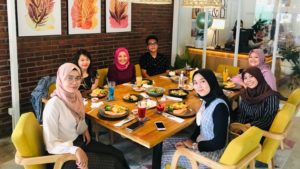In 2021, Pure Earth worked with one of the leading universities in Indonesia to recruit young graduates for the Toxic Sites Identification Program (TSIP), which trains pollution investigators around the world to identify, assess and document contaminated sites in their communities. What was special about this particular team was that it consisted solely of women–five young STEM graduates: Nandalita Alifia Atallanis (Nanda), Laili Zahratul Rizqia (Laili), Helma Alwiga Triskio Ronanda (Helma), Rafelia Audina Windartya (Rafel), and Aileen Indonesia (Elen). While women have always been part of Pure Earth’s TSIP investigative teams, this is the first time we have assembled an all-female team in Indonesia.
Budi Susilorini, Pure Earth Indonesia Country Director, reflects on this team.
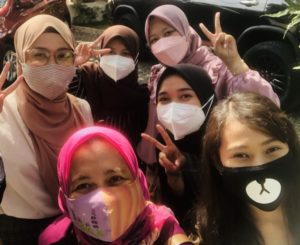
To be honest, at first, I doubted that they would meet the challenge. Considering that investigators have to work in the field for a long period of time, have tight work and travel schedules, and have to interact with the communities and business actors from the formal and informal sectors. TSIP investigators have a big responsibility. They have to collect and present data, which will later be reported to the Government of Indonesia, and become a reference for Pure Earth for strategy development for lead risk reduction projects in Indonesia. However, I put aside my doubts because they are young people who should be given the opportunity, and it is important for them to be exposed to the issue of pollution. Moreover, I am also a woman and I realize I should not doubt my own gender!
After all I myself was given this opportunity. I have worked for Pure Earth for 13 years leading the Indonesia program. There are many reasons I love my job, of which the most important is Pure Earth’s dedication to minimizing the risk of children’s exposure to toxic pollution. To achieve this goal, I have been given the freedom to work with various institutions, including universities and academia. These young women, and others that follow them, should also have the chance to use their talents to make an impact.
Working under guidance from their seniors and the team from Pure Earth, the team excelled. My doubts disappeared, replaced with pride in Nanda, Laili, Helma, Rafel and Elen, who at their very young age, have been able to show strong commitment, dedication, and professionalism.
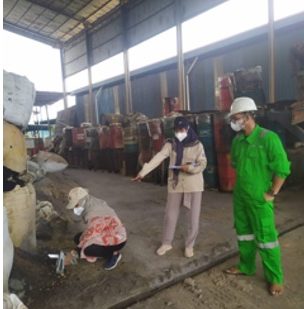
Over the course of their training and assignments, the five environmental engineering graduates became close friends and collaborators. The similarity of their scientific backgrounds was a distinct advantage. Their skills complemented each other during the implementation of activities in the field. They worked as an effective, cohesive team.
They told me that they saw their work as TSIP investigators not as just a job, but as a very valuable experience that has allowed them to develop their skills for future work.
“I learned how to adapt to the people in Java and Sumatra who are culturally different. I also learned English to present the identification results to Pure Earth, how to operate new equipment to identify heavy metals using an XRF (X-ray fluorescence) analyzer, and to coordinate with the team for four months,” said Helma.
“I am glad that we were given this opportunity to work, learn and prove ourselves,” Nanda added, “…because I thought I could not work in the field and interact with strangers. But, now I know I can push myself to learn by doing.”
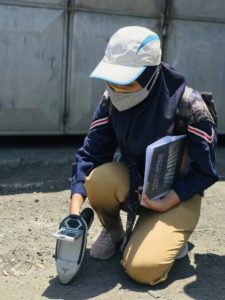
The five women are now exposed to the issue of lead pollution not just in theory, but also from practical observations in the field. The investigations have given them a new perspective on pollution and its impact on the surrounding areas, as well as insight about the people who depend on the informal recycling of used lead-acid batteries (ULAB) for their livelihoods–a common source of lead exposure.
“Many people think used batteries are not hazardous waste. Living in a poor economy with lack of education, they underestimate the long-term impact on their health. Pollution from informal battery recycling activities affects not just people or the environment in direct contact with polluters, but it also spreads to plants and livestock,” said Laili.
When carrying out field activities, the team was faced with challenges, including the sensitivity of residents to outsiders and the search for pollutants, especially in the informal sector. Interaction in the field with people from different backgrounds tested their ability to communicate. The women learned how to effectively get the information they need. They learned to think tactically, be adaptive, and make decisions quickly.
Nanda recalled: “Being women helped us because we were friendly. So, the villagers were more open to us, and shared some information. Some of them were excited to tell us what negative impact that they felt, but they could not do anything about it. I hope our presence can help them.”
Elen also thought their professionalism helped. “We looked like students who were doing research, and we were also polite, so that it was easy to get along with stakeholders.”
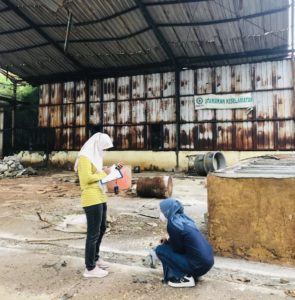
What’s next for these women?
The location of the activities spread across the island of Java and Sumatra strengthened Nanda and Helma’s hearts to be open to work opportunities anywhere. Meanwhile, traveling to various locations actually brought Rafel’s heart closer to her family, so she will look for work closer to her hometown in Malang, East Java. For Laili, TSIP has given her the opportunity to work outside before returning and working in her hometown in Tuban, East Java. And Elen, grateful for the opportunity to work and explore new things with TSIP, has returned to complete her masters degree.
Despite having different ambitions, these five young women agree that their involvement in TSIP has made them feel more confident in their abilities and that – as women – they are capable of doing things that they previously considered difficult.
“Whatever it takes to make a difference, do it girl! Because kindness does not discriminate based on a person’s gender, ” Rafel said when I asked her what advice she would give to other women.
Laili agreed adding, “If you have the opportunity, you should do what you can, and not regret it later. Gender is not a weakness, so do not limit yourself.”
“No need to be ashamed, no need to be discouraged. We are great, awesome, and very independent…. What we do is one way to save the earth from destruction. We are superwomen!” proclaimed Elen.
Now these five women carry with them a deeper understanding of the environmental problems facing Indonesians, and will be able to help lead the way to improving lives at their next job. They are only at the start of their careers, but have already made an impact.
I close this article with joy that my work not only allows me to contribute to maintaining the health of Indonesian children, but also to contribute to the formation of the characters of young Indonesian women. By investing in women, we encourage them to be confident, tough and caring about their environment, and that is priceless.
This post is by Budi Susilorini, Pure Earth Indonesia Country Director, with contributions from Rizki Aulianisa. This work is possible thanks to the generous support of the Clarios Foundation.
